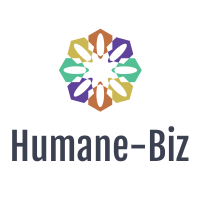
What is Corporate Human Rights Due Diligence and Why do I Need it?
The main objective of the Human Rights component of LH Law&Consulting's Human Rights Consulting is to manage the legal, financial and reputational risks arising from adverse human rights impacts generated by business operations, and to ensure the company's compliance with the growing local legislation on the matter, such as the European Union's Due Diligence Directive Proposal. In particular, we seek to advise companies whose supply chains are located in Latin America and emerging countries on the management of their associated risks, using state-of-the-art technology from our alliances to enable comprehensive stakeholder engagement and community risk management.
Since 2011, when the United Nations Human Rights Council approved the Guiding Principles on Business and Human Rights, several international instruments have emerged that provide guidelines, considered as soft law, i.e., non-binding norms for States. However, other instruments such as the American Convention on Human Rights oblige the State to require respect for human rights on all the inhabitants of its national territory. The same is true in most developed States, which have regulations that require respect for conduct related to the full enjoyment of human rights by the inhabitants of the territory and of those territories where their nationals are located. Therefore, adversely impacting human rights can bring a company multimillion-dollar litigation before national and foreign jurisdictions, and even indirectly before international courts.
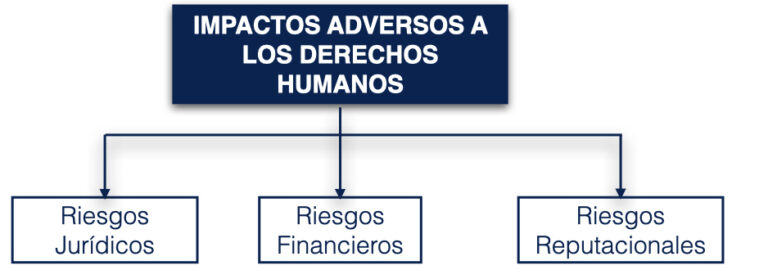
In addition, the impact of a scandal in which a company is directly or indirectly (for example, through the actions of companies within its supply chain) accused of violating human rights nowadays, with the existence of social networks, has the potential to generate multi-million dollar losses for the company.
This type of contingency, in turn, generates an enormous financial risk for the company, since litigation, with the payment of litigation and legal defense costs alone, is normally in the multi-millions, not including possible convictions and administrative sanctions.At the same time, the existence of scandals and pending litigation makes it difficult, if not impossible, to attract domestic and, above all, foreign investors, while, on the other hand, a good human rights management report is a fundamental tool for convincing foreigners that investing in the company is a wise and safe decision for their interests.
An increasing number of investors are demanding a due diligence process from the companies in which they have an interest in mergers and acquisitions processes, as this also safeguards the legal, financial and reputational interests of those who wish to invest.
The following image portrays how several actors monitor the accountability of corporate Human Rights respect. If the Company does not implement a Human Rights Due Diligence process, which integrates the vertex of self-regulation of its actions, only external actors such as stakeholders, civil society organizations, government, consumers, social networks and employees will do so, generating an imbalance in the network.
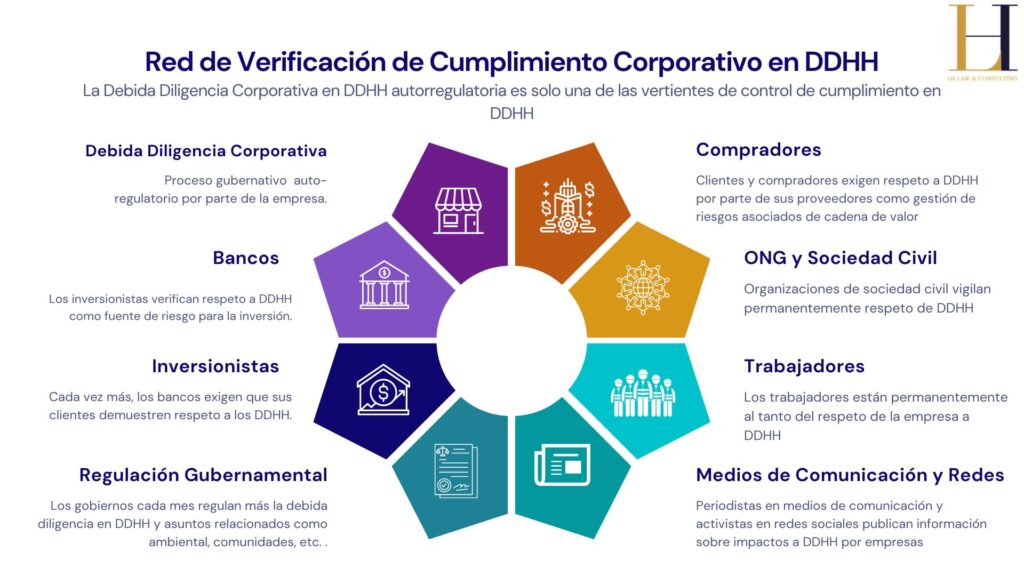
Many companies may be confused as to whether they should be working on Sustainability or ESG or Business and Human Rights, or whether Biz & HR is part of any of the above issues. This is a discussion that has generated much debate among those of us who practice in these areas, but increasingly, leading bodies such as the United Nations and other industry leaders such as the Global Reporting Initiative, or GRI, have been recognizing that the implementation of human rights due diligence according to international standards is a fundamental part of both sustainability and ESG criteria. This is even more accurate after the formal recognition in July 2022 by the United Nations of the Right to a Healthy Environment as a Human Right, although the issue was already being addressed through respect for other rights, such as the Right to Life, Health, Water and a Decent Standard of Living.
The basic difference between ESG and Sustainability, on the one hand, and Business and Human Rights, on the other, lies in the fact that the former have an important ingredient of willingness on the part of companies in their implementation, although some fundamental aspects included here already have special state regulation, such as in environmental issues.
On the contrary, respect for human rights by the company is mandatory either under national regulations of the investors' countries of origin, or under international human rights conventions ratified at a near universal level.
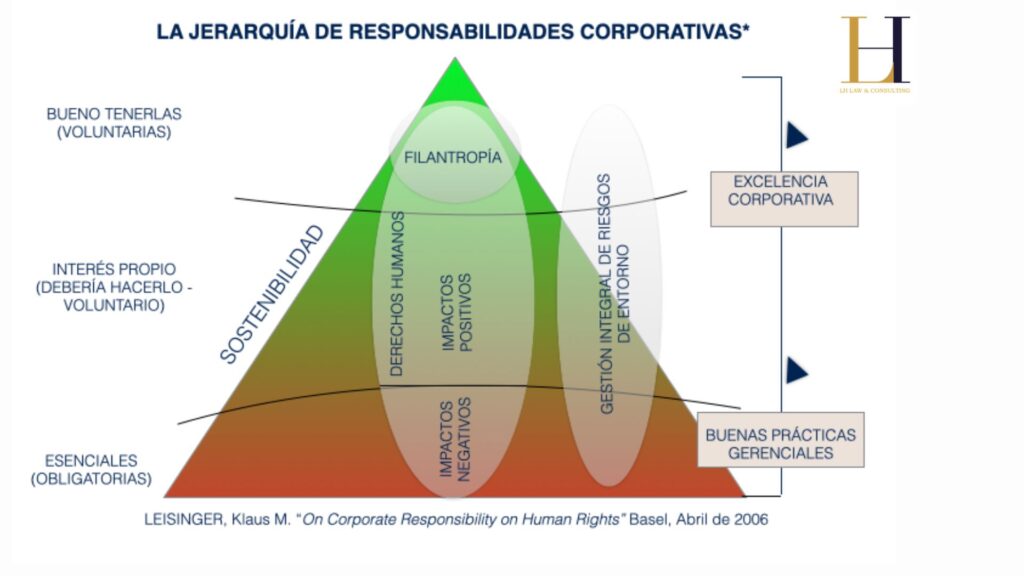
Therefore, companies must remediate any adverse impacts generated within their own operations, and support the remediation by those to which they are linked through their value chain.
Failure to comply with the standards entails legal consequences, such as tort or even criminal liability claims for its managers and employees, or administrative sanctions, as well as reputational and economic risks. Respecting them by implementing a Corporate Human Rights Due Diligence strategy generates undisputed reputational and financial benefits for the company.
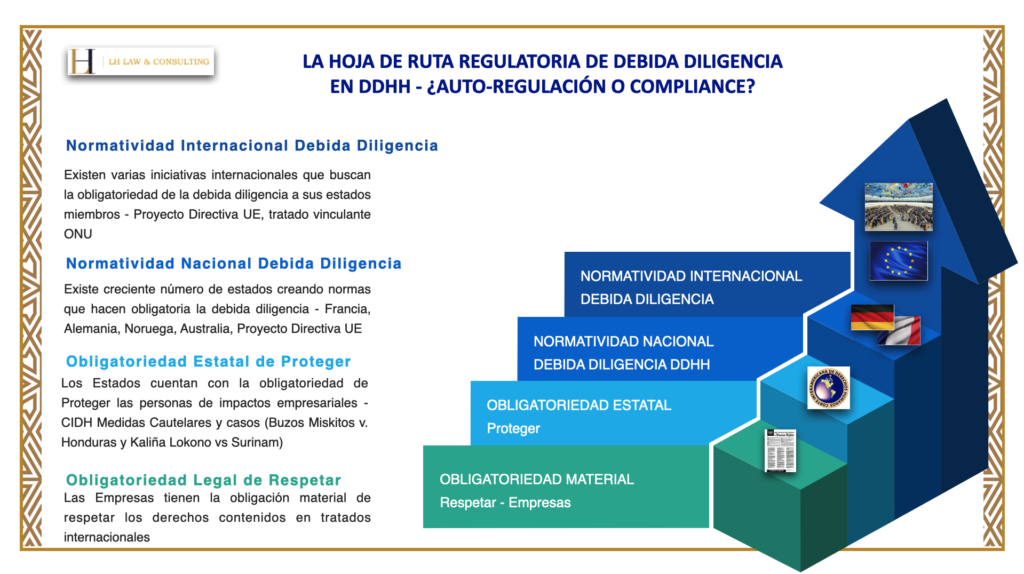
The need for companies to carry out human rights due diligence processes is expanding every day, as a result of increasingly extensive national and international regulation in this area.
While it is clear that companies are obliged to respect human rights by virtue of the ratification of international treaties by the states in which they operate, the requirement to carry out due diligence processes according to international standards, especially the United Nations Guiding Principles on Human Rights and the OECD Guidelines for Multinational Enterprises, is growing day by day.
International organizations, such as the regional human rights systems, including the European and Inter-American systems, have already recognized the international responsibility of states to implement norms and policies that oblige private parties, including companies, to respect the human rights of third parties.
But more and more states, including pioneers such as France, Germany and Norway, soon the European Union with its Human Rights Due Diligence Directive, and the proposal for a binding business and human rights treaty at the United Nations, make implementing robust due diligence processes no longer a matter of self-regulation, but a full-fledged corporate compliance issue.
Countries in Latin America such as Colombia are likely to join the trend soon, as entities such as the Ombudsman's Office are working on the creation of a bill to make human rights due diligence mandatory for companies operating in the country.
LH Law & Consulting considers this a very positive issue, not only for the people who will be protected by a responsible conduct on the part of the companies, but also for the companies themselves, since they will be forced to manage one of the greatest risks to their livelihood, which is the one that represents a possible serious impact on human rights. This issue is a win-win for all stakeholders and actors involved in sustainable and responsible business practices.
We invite you to learn more about the Business and Human Rights consulting services that LH Law & Consulting offers to companies located anywhere in the world by clicking here:
How are the risks of adverse human rights impacts within the value chains of companies addressed?
International human rights standards such as the United Nations Guiding Principles on Business and Human Rights and the OECD Guidelines for Multinational Enterprises, as well as national and regional due diligence regulations, such as the European Union's Proposed Due Diligence Directive, and the laws of France, Germany and Norway, require companies to identify and adequately manage the risks of adverse human rights impacts identified within their value chains.
There are companies with thousands of suppliers spread across the globe, which creates a huge challenge for this purpose, especially given many of these companies are SMEs located in regions such as Latin America, Africa and Southeast Asia, where government regulation for the protection of human rights tends to be fragile and deficient.
For this reason, LH Law & Consulting has signed a joint venture with Equilibre Consultants to create Humane-Biz, a social impact startup whose platform allows for the provision of consulting services on a massive and democratic scale to SMEs and companies that are part of the global value chains, at extremely affordable prices for them, as well as for their Sponsor Companies. We invite you to visit our website to learn more.

